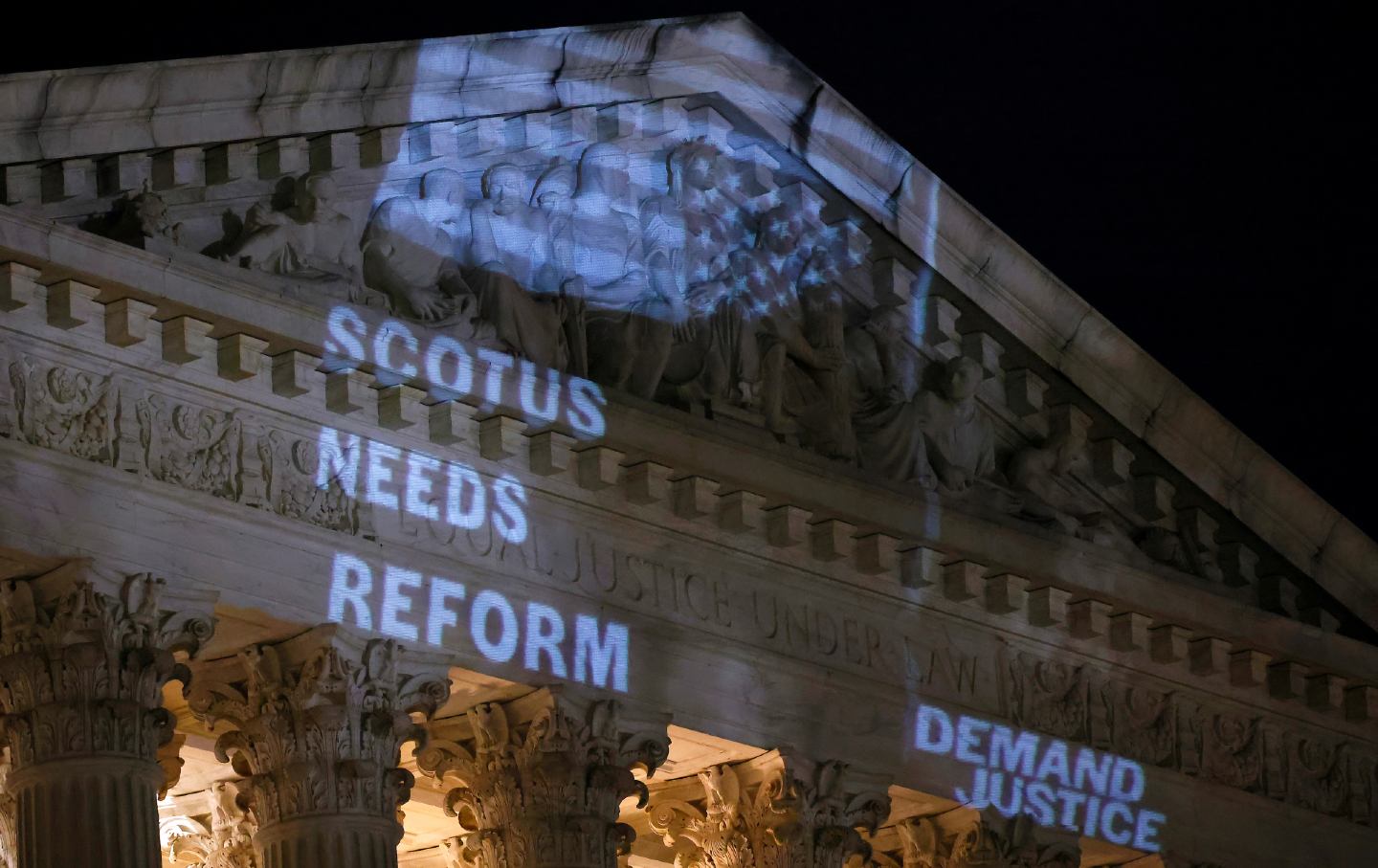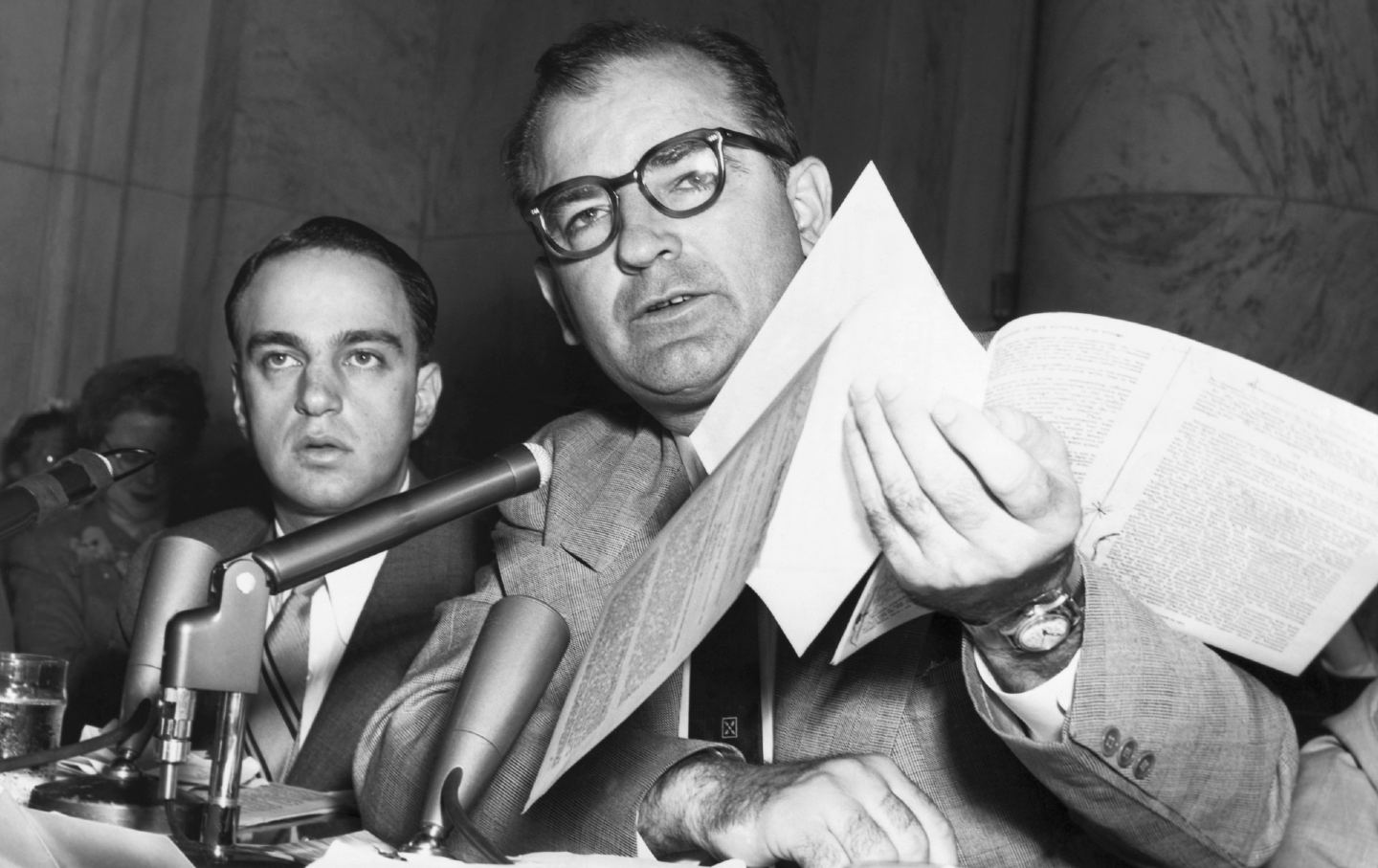The Upside-Down Ethics of The Washington Post
The newspaper sat on the Alito flag story for three and half years. It reveals how clinging to a notion of journalistic impartiality can harm basic reporting.
The Upside-Down Ethics of “The Washington Post”
The newspaper sat on the Alito flag news for three and a half years. The story reveals how clinging to a notion of journalistic impartiality can harm basic reporting.

Demand Justice projects the “Stop the Steal” upside-down American flag on the US Supreme Court Building on May 21, 2024, to call attention to Justice Alito’s actions in Washington, DC.
(Paul Morigi / Getty Images for Demand Justice)
Under the labored catechisms of journalistic neutrality, institutions such as The Washington Post insist that only their brand of bloodless onlooking can meet the needs of democratic public deliberation. Anything even faintly suggestive of advocacy or principled argument is to be shunned as a defilement of the discursive mores of an objective and impartial press.
This posture is, of course, bullshit, as anyone who trudged through former Post managing editor Marty Baron’s Trump-era memoir can attest. But thanks to a rushed, stupefying account of the Post’s decision to sit on the Alito family’s flag-provocation story for nearly three and a half years, we can appreciate that the mantras of journalistic impartiality are not merely delusions of a professional-managerial caste; they prevent basic news reporting.
On January 20—the day of Joe Biden’s inauguration, which the Alitos did not attend—the Post’s then–Supreme Court correspondent, Robert Barnes, went to the Alitos’ Fairfax County neighborhood to follow up on a tip that an upside-down American flag had flown outside the Alitos’ home. The “Stop the Steal” movement, which promulgated the lie that the 2020 presidential election was rigged by Democrats, had adopted the inverted flag as an emblem; for it to appear outside a sitting Supreme Court justice’s home just days after the January 6 insurrection at the US Capitol was obviously important news.
The behavior of the Alitos when Barnes happened to run into them outside their home was also newsworthy. As the Post’s retrospective story recounts, Alito’s wife, Martha-Ann, “was visibly upset by [Barnes’s] presence, demanding that he ‘get off my property.’” But first Barnes was evidently expected to sit still for her extensive berating. When he queried her about the flag display, she yelled, “It’s an international symbol of distress!”—somehow failing to explain how and why military personnel patrolling nearby would be expected to come to her rescue.
In the heat of this exchange, Samuel Alito, thrust into the disorienting position of potential public accountability, decided that tamping down his spouse’s distress was the better part of valor; he bustled her into the couple’s car, while gamely debuting the preposterous body of alibis he delivered to New York Times reporter Jodi Kantor when she broke the flag story. “The justice denied the flag was hung upside down as a political protest, saying it stemmed from a neighborhood dispute and indicating that his wife had raised it,” the Post story wanly informs us.
Things soon got weirder, since Martha-Ann decided that she should have both the last word and the crowning symbolic gesture:
Martha-Ann Alito then got out of the car and shouted in apparent reference to the neighbors: “Ask them what they did!” She said yard signs about the couple had been placed in the neighborhood. After getting back in the car, she exited again and then brought out from their residence a novelty flag, the type that would typically decorate a garden. She hoisted it up the flagpole. “There! Is that better?” she yelled.
Repairing back to the paper bedecked with the slogan “Democracy dies in darkness,” Barnes consulted with the paper’s then–senior managing editor, Cameron Barr, and they pooled their wisdom to arrive at the conclusion that there was nothing to see here. The Post’s retinue of wise men agreed that “we should not do a single-slice story about the flag, because it seemed like the story was about Martha-Ann Alito and not her husband,” Barr told Semafor’s Ben Smith. “In retrospect, I should have pushed harder for that story.”
You think? Again, this was two weeks after a right-wing coup to overturn the results of a free and fair election, involving a Supreme Court–affiliated household that was then in the act of boycotting the inauguration of that election’s winner. What’s more, the explicit strategy behind the Capitol insurrection was to disrupt the certification of election results in Congress long enough to deliver the process into the hands of Alito and his right-wing colleagues on the high court, thereby triggering the country’s second Supreme Court–orchestrated transfer of executive power to the right in the 21st century. In no universe could this bizarre encounter be written off to the quirky domestic confrontations engineered by Alito’s wife; even taking everything at face value, it’s at least worth greenlighting a piece that would explicate the far-from-inconsequential political views and belligerent rhetoric taken up by Martha-Ann Alito, just as the parallel sedition antics of Supreme Court spouse Ginni Thomas have been self-evidently newsworthy for some time. (All this is to say nothing, of course, of the Alitos’ display of a Christian nationalist “Appeal to Heaven” flag at their New Jersey beach house—an antidemocratic and theocratic flourish that they haven’t even bothered to try to fob off on their northern Virginia neighbors.)
To file away the Alitos’ joint Inauguration Day tantrum on the couple’s front lawn is not some sober adjudication of controlling public versus private interests as they pertain to one of the most influential and powerful couples in American politics; it is, rather, a dereliction of journalistic duty, very much of a piece with the serial failures of baseline skepticism that consigned the fortunes of the American republic into the hands of a petty criminal authoritarian bully who continues to gleefully exploit the self-induced blindspots and learned helplessness of a recklessly deferential media class. That the Post so confidently chucked the flag scoop into the “Who cares?” file says all you need to know about a journalistic and political establishment that reflexively bows in the face of elite institutions. So much for defending democracy with the disinfectant of sunlight.
Except, that is, for one other telling detail. Near the top of the Post’s mea-non-culpa reprisal of the Alito flag saga, there’s this non sequitur descent into corporate-sanctioned non-signification: “The Post decided not to report on the episode at the time because the flag-raising appeared to be the work of Martha-Ann Alito, rather than the justice, and connected to a dispute with her neighbors, a Post spokeswoman said. It was not clear then that the argument was rooted in politics, the spokeswoman said.”
Got that? One of our leading outlets of national political journalism prevailed on an unnamed press flack in its own employ to supply a plainly discredited rationale for its failure to report out a major political scoop in its own backyard. Is it any wonder that this journalistic institution’s first instinct in nailing down the Alito flag saga was to wave it off? In Beltway journalism, as in all the other major redoubts of American power, the prime directive isn’t to report the truth without fear or favor; it’s to seek plausible deniability at all costs—even three years after you’ve blown a story your readers needed to know about in the immediate aftermath of a right-wing coup attempt.








